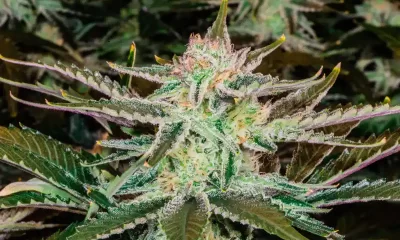Business
Michigan Regulator Suspends Cannabis Processor’s License

The Michigan Cannabis Regulatory Agency has suspended the license of a marijuana processor accused of using illicit cannabis to manufacture its products.
The Michigan Cannabis Regulatory Agency this week suspended the license of one of the state’s licensed marijuana processors, alleging that the company used illicit cannabis extract to manufacture some of its products. In an announcement from the Michigan Cannabis Regulatory Agency (CRA) released on Tuesday, the regulator announced that it has issued formal complaints against TAS Asset Holdings, LLC in Lansing and placed a summary suspension on the firm’s license to process medical marijuana and adult-use cannabis.
The CRA said that the processor’s marijuana flower coated with cannabis concentrates known as space rocks was manufactured with illicit isolate that had not been tested for purity and safety and had not been entered in Metrc, the seed-to-sale cannabis tracking system used to monitor the movement of licensed cannabis throughout the state. The agency also issued a marijuana consumer advisory bulletin warning the company’s customers that the products, which were marketed under the Fwaygo Extracts brand name and manufactured between November 10, 2022, and November 17, 2022, were not produced in compliance with state statutes and administrative regulations and may be unsafe. CRA advised consumers who have experienced adverse reactions after using the products to report their symptoms and product use to their healthcare providers.
“The conduct alleged in the formal complaints is a significant risk to the public health and safety of marijuana consumers in Michigan,” CRA executive director Brian Hanna said in a statement from the agency. “While we work through the process to seek revocation of these licenses, it is vital that all licensees throughout the state realize that the CRA will continue to do what it takes to protect the public from bad actors in the regulated market.”
The CRA noted that in September, two packages of vape cartridges handled by TAS had tested positive for the presence of bifenthrin, a chemical insecticide that is banned from use in Michigan’s regulated cannabis market. Before they were transferred to and processed by TAS Asset Holdings, both packages of cartridges had passed full safety compliance testing with no bifenthrin detected.
The agency then began an investigation to determine the cause of the safety compliance failure. A review of surveillance footage recorded at the TAS facility showed that the cannabis product used to make the vape cartridges was not the same product recorded in Metrc that had passed compliance testing. The product used to make the vape cartridges had not been properly processed as part of the regulated market or entered into Metrc.
“During the investigation, CRA staff noted that the business had many areas that were dirty and cluttered and had leaking containers of various process stages of marijuana and waste,” the regulator maintains. “The CRA investigators observed an unapproved, unlicensed warehouse being utilized as a part of the licensed business. The CRA investigators also observed various untagged marijuana products including flower, distillate, concentrates, and THCa powder in the unapproved warehouse.”
Regulators discovered several mason jars filled with oil and three barrels and two black totes that were filled with an unknown substance in the unapproved warehouse. The unlicensed area did not have surveillance cameras, and none of the marijuana products in the room had Metrc tags as required by state regulations, the CRA alleged in its announcement.
“A TAS representative admitted that the business’s signature product, “Space Rocks,” is produced using the untagged THCa powder,” the CRA wrote. “The investigation also showed that TAS was storing and interchanging illicit marijuana products with regulated product found at the business. A safe on the premises contained three jars of distillate and five jars of marijuana concentrate that did not have Metrc tags affixed.”
Video surveillance also showed that TAS employees had brought unlicensed cannabis product into the manufacturing from a personal vehicle. The product did not have a Metrc tag and could not be traced back to a licensed business.
The formal complaint from the CRA alleges 23 regulatory violations against each of TAS Asset Holdings’ cannabis processor licenses. The company is permitted to request a hearing to contest the allegations in the complaint. State law also provides for a hearing to determine whether the summary suspensions ordered by the regulator should remain in effect.
The CRA’s action against TAS is the second time this month the regulator has suspended a cannabis processor’s license. On February 3, the CRA suspended the licenses held by Candid Labs, a processor in Corunna, Michigan operating under the name Layercake Farms. During an investigation, the CRA discovered jars of cannabis distillate that did not have required Metrc tags.
“Based on its investigation of the conduct alleged in the formal complaints, the CRA determined that the safety or health of patrons or employees is jeopardized by Candid Labs’ continued operation and that the public health, safety, or welfare requires emergency action,” the CRA said in a statement at the time.
Source: https://hightimes.com/news/michigan-regulator-suspends-cannabis-processors-license/
Business
New Mexico cannabis operator fined, loses license for alleged BioTrack fraud

New Mexico regulators fined a cannabis operator nearly $300,000 and revoked its license after the company allegedly created fake reports in the state’s traceability software.
The New Mexico Cannabis Control Division (CCD) accused marijuana manufacturer and retailer Golden Roots of 11 violations, according to Albuquerque Business First.
Golden Roots operates the The Cannabis Revolution Dispensary.
The majority of the violations are related to the Albuquerque company’s improper use of BioTrack, which has been New Mexico’s track-and-trace vendor since 2015.
The CCD alleges Golden Roots reported marijuana production only two months after it had received its vertically integrated license, according to Albuquerque Business First.
Because cannabis takes longer than two months to be cultivated, the CCD was suspicious of the report.
After inspecting the company’s premises, the CCD alleged Golden Roots reported cultivation, transportation and sales in BioTrack but wasn’t able to provide officers who inspected the site evidence that the operator was cultivating cannabis.
In April, the CCD revoked Golden Roots’ license and issued a $10,000 fine, according to the news outlet.
The company requested a hearing, which the regulator scheduled for Sept. 1.
At the hearing, the CCD testified that the company’s dried-cannabis weights in BioTrack were suspicious because they didn’t seem to accurately reflect how much weight marijuana loses as it dries.
Company employees also poorly accounted for why they were making adjustments in the system of up to 24 pounds of cannabis, making comments such as “bad” or “mistake” in the software, Albuquerque Business First reported.
Golden Roots was fined $298,972.05 – the amount regulators allege the company made selling products that weren’t properly accounted for in BioTrack.
The CCD has been cracking down on cannabis operators accused of selling products procured from out-of-state or not grown legally:
- Regulators alleged in August that Albuquerque dispensary Sawmill Sweet Leaf sold out-of-state products and didn’t have a license for extraction.
- Paradise Exotics Distro lost its license in July after regulators alleged the company sold products made in California.
Golden Roots was the first alleged rulebreaker in New Mexico to be asked to pay a large fine.
Source: https://mjbizdaily.com/new-mexico-cannabis-operator-fined-loses-license-for-alleged-biotrack-fraud/
Business
Marijuana companies suing US attorney general in federal prohibition challenge

Four marijuana companies, including a multistate operator, have filed a lawsuit against U.S. Attorney General Merrick Garland in which they allege the federal MJ prohibition under the Controlled Substances Act is no longer constitutional.
According to the complaint, filed Thursday in U.S. District Court in Massachusetts, retailer Canna Provisions, Treevit delivery service CEO Gyasi Sellers, cultivator Wiseacre Farm and MSO Verano Holdings Corp. are all harmed by “the federal government’s unconstitutional ban on cultivating, manufacturing, distributing, or possessing intrastate marijuana.”
Verano is headquartered in Chicago but has operations in Massachusetts; the other three operators are based in Massachusetts.
The lawsuit seeks a ruling that the “Controlled Substances Act is unconstitutional as applied to the intrastate cultivation, manufacture, possession, and distribution of marijuana pursuant to state law.”
The companies want the case to go before the U.S. Supreme Court.
They hired prominent law firm Boies Schiller Flexner to represent them.
The New York-based firm’s principal is David Boies, whose former clients include Microsoft, former presidential candidate Al Gore and Elizabeth Holmes’ disgraced startup Theranos.
Similar challenges to the federal Controlled Substances Act (CSA) have failed.
One such challenge led to a landmark Supreme Court decision in 2005.
In Gonzalez vs. Raich, the highest court in the United States ruled in a 6-3 decision that the commerce clause of the U.S. Constitution gave Congress the power to outlaw marijuana federally, even though state laws allow the cultivation and sale of cannabis.
In the 18 years since that ruling, 23 states and the District of Columbia have legalized adult-use marijuana and the federal government has allowed a multibillion-dollar cannabis industry to thrive.
Since both Congress and the U.S. Department of Justice, currently headed by Garland, have declined to intervene in state-licensed marijuana markets, the key facts that led to the Supreme Court’s 2005 ruling “no longer apply,” Boies said in a statement Thursday.
“The Supreme Court has since made clear that the federal government lacks the authority to regulate purely intrastate commerce,” Boies said.
“Moreover, the facts on which those precedents are based are no longer true.”
Verano President Darren Weiss said in a statement the company is “prepared to bring this case all the way to the Supreme Court in order to align federal law with how Congress has acted for years.”
While the Biden administration’s push to reschedule marijuana would help solve marijuana operators’ federal tax woes, neither rescheduling nor modest Congressional reforms such as the SAFER Banking Act “solve the fundamental issue,” Weiss added.
“The application of the CSA to lawful state-run cannabis business is an unconstitutional overreach on state sovereignty that has led to decades of harm, failed businesses, lost jobs, and unsafe working conditions.”
Business
Alabama to make another attempt Dec. 1 to award medical cannabis licenses

Alabama regulators are targeting Dec. 1 to award the first batch of medical cannabis business licenses after the agency’s first two attempts were scrapped because of scoring errors and litigation.
The first licenses will be awarded to individual cultivators, delivery providers, processors, dispensaries and state testing labs, according to the Alabama Medical Cannabis Commission (AMCC).
Then, on Dec. 12, the AMCC will award licenses for vertically integrated operations, a designation set primarily for multistate operators.
Licenses are expected to be handed out 28 days after they have been awarded, so MMJ production could begin in early January, according to the Alabama Daily News.
That means MMJ products could be available for patients around early March, an AMCC spokesperson told the media outlet.
Regulators initially awarded 21 business licenses in June, only to void them after applicants alleged inconsistencies with how the applications were scored.
Then, in August, the state awarded 24 different licenses – 19 went to June recipients – only to reverse themselves again and scratch those licenses after spurned applicants filed lawsuits.
A state judge dismissed a lawsuit filed by Chicago-based MSO Verano Holdings Corp., but another lawsuit is pending.
Source: https://mjbizdaily.com/alabama-plans-to-award-medical-cannabis-licenses-dec-1/
-

 Business2 years ago
Business2 years agoPot Odor Does Not Justify Probable Cause for Vehicle Searches, Minnesota Court Affirms
-

 Business2 years ago
Business2 years agoNew Mexico cannabis operator fined, loses license for alleged BioTrack fraud
-

 Business2 years ago
Business2 years agoAlabama to make another attempt Dec. 1 to award medical cannabis licenses
-

 Business2 years ago
Business2 years agoWashington State Pays Out $9.4 Million in Refunds Relating to Drug Convictions
-

 Business2 years ago
Business2 years agoMarijuana companies suing US attorney general in federal prohibition challenge
-

 Business2 years ago
Business2 years agoLegal Marijuana Handed A Nothing Burger From NY State
-

 Business2 years ago
Business2 years agoCan Cannabis Help Seasonal Depression
-

 Blogs2 years ago
Blogs2 years agoCannabis Art Is Flourishing On Etsy













